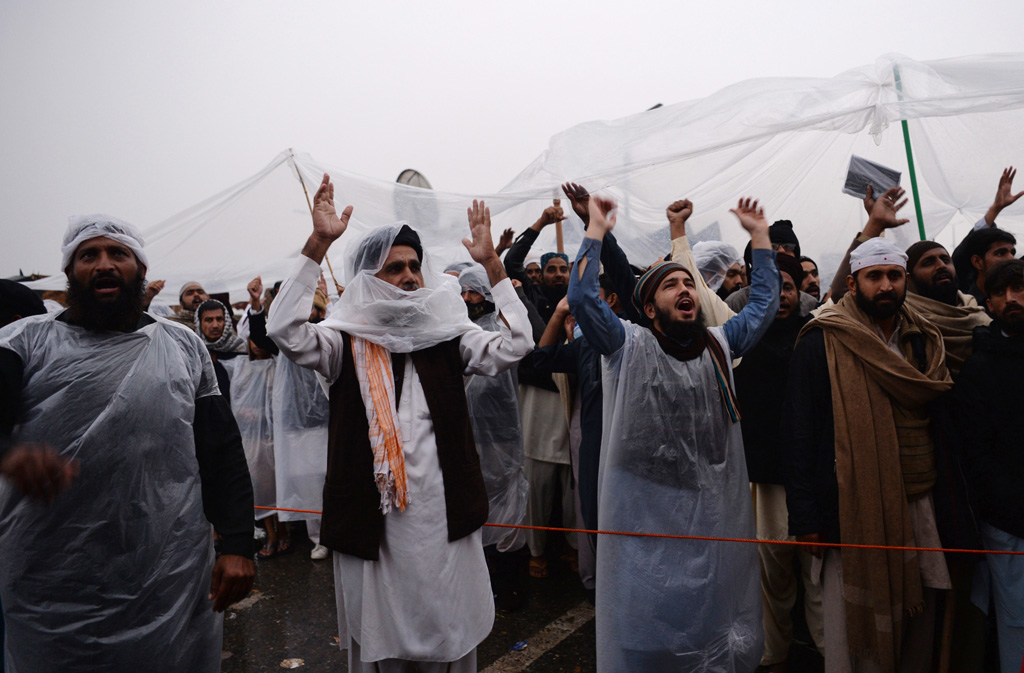SC's TLP verdict

The Supreme Court (SC) has delivered a hard-hitting, critical detailed judgement regarding the Tehreek-i-Labaik Pakistan (TLP) 20-day dharna (sit-in) at Faizabad Chowk in November 2017 that disrupted life in Islamabad and Rawalpindi. Addressing the government, the judgement says violent protestors who infringe other citizens' rights, including freedom of movement and right to property, must be proceeded against and held accountable. To the intelligence agencies, the court offers the following advice: do not ignore promoters of violence, hate, extremism. Self-appointed fatwa (religious edict) peddlers who declare people liable to be killed on spurious grounds amongst other negative consequences should be prosecuted, says the SC. For the Election Commission of Pakistan (ECP) the court says it should act against political parties violating the election laws and failing to divulge the source of their funding. Media suppression through overt/covert censorship, self-censorship 'advice', 'directions' as to who can be hired/fired, cable operators stopping or interrupting broadcasts, preventing distribution of newspapers have all been held patently illegal and unconstitutional. While advising that laws should be enacted to clearly spell out the respective mandates of the intelligence agencies, the SC requires the heads of the armed forces to penalise any personnel under their command for indulging in political activities. The verdict particularly refers to the cash handouts to the TLP Faizabad protestors by uniformed men in the clear light of day as contributing to the perception of the intelligence agencies being involved in such activities. Justice Qazi Faez Isa, who authored the judgement, traced the ISI's history and argued that when institutions stay within their designated constitutional boundaries and there exist effective checks and balances, citizens remain safe and the state prospers. The trouble starts with self-proclaimed saviours, the SC points out. The police and law enforcement agencies are required to develop standard operating procedures and plans to handle rallies, protests and sit-ins with sufficient flexibility to deal with different situations. In maintenance of law and order, the SC says, every effort must be made to avoid injury and deaths. The SC has ordered the distribution of copies of the verdict to government, concerned ministries, the armed forces, intelligence agencies, etc, i.e. all those to whom the judgement speaks.
There can be no denying the fact that the SC verdict delves into phenomena and their consequences that have over the decades eroded the rule of law and rendered constitutional provisions infructuous. It also names the institutions responsible, points out their derelictions of duty and expanding their remit beyond what the law and Constitution allows, and envisages accountability for those transgressions. As to the right of peaceful protest permitted by the Constitution, the SC defines the limit of such protest at the line where others' fundamental rights are violated. In a telling reference, the verdict cites the example of the May 12, 2007 massacre of citizens wanting to greet deposed Chief Justice of Pakistan Iftikhar Mohammad Chaudhry at Karachi airport and the failure of holding to account those responsible, which set a terrible example and emboldened others to think that violence could help them achieve their goals. While the verdict ranges over and virtually constitutes a stinging rebuke to the perpetrators of extremism, violence, hatred and intimidation, it does not shrink from calling into question state institutions' transgressions above and beyond the law as well as dereliction of duty in ensuring law and order and peace in the country.
While the SC verdict delivers a body blow to many things that are wrong in our state and society as reflected in the TLP Faizabad event, one could be forgiven for some degree of cynicism regarding the impact on, and subsequent response of, the institutions taken to task in the judgement. Given the present landscape, can the SC follow up on its verdict to ensure its strictures are paid attention to and orders implemented? An intriguing thought that flies in the face of our track record.



















Comments
Comments are closed.